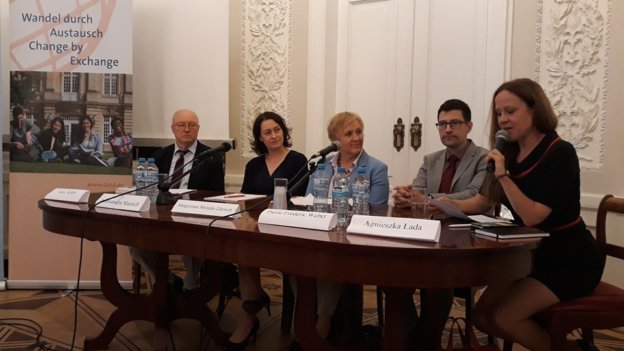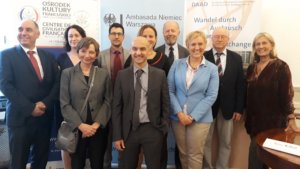On May 28 2019, a conference ‘After the European elections. What future for Europe?’ was held at the University of Warsaw. This French-Polish-German scientific meeting took place as part of the series ‘Academic looks: seminar Actualité critique’, organized by the Centre of French Culture and Francophone Studies of the University of Warsaw and the French Institute. The co-organizers of the event were: the Science Department of Embassy of the Federal Republic of Germany, the Polish Science Contact Agency in Brussels, the Societas Humboldtiana Polonorum, the German Academic Exchange Service (DAAD), the Institute of European Studies of the Polish Academy of Sciences and the Institute of Philosophy of the University of Warsaw in cooperation with the École Normale Supérieure Paris.
Due to the current topic of the event (just two days after the elections to the European Parliament) and prestigious partners, the conference met with great interest. The audience consisted of students, young researchers and retired university employees.
The program of the event included a panel debate moderated by Agnieszka Łada, PhD, an analyst of the Institute of Public Affairs. The conference panel was attended by scientists from various research and academic centres in Poland:
- Aleksandra Maatsch, PhD, Center for German and European Studies Willy Brandt of the University of Wroclaw
- Małgorzata Molęda-Zdziech, prof. SGH Warsaw School of Economics, Polish Science Contact Agency in Brussels
- Pierre-Frédéric Weber, prof. of University of Szczecin
- Jerzy Wilkin, prof. Institute for Rural Development and Agriculture of the Polish Academy of Science
What was characteristic for last campaign to the European Parliament? Experts strongly pointed out intensified disinformation activities (underlined in the EC reports) or still unfinished negotiations regarding the exit of the United Kingdom from the European Union (so-called Brexit).
All speakers agreed that the high electoral turnout (both the EU average and the individual results for each of the Member States) distinguished this campaign from the previous ones. Attention was also paid to the success of pro-ecological groups in Germany, which can be seen as a sign of a certain consciousness change that has taken place in recent years. Topics of climate change, clean air, renewable energy have entered the political mainstream.
Professor Wilkin presented the main conclusions of Scientific Report of the Polish Academy of Sciences on European integration and the place of Poland in this process. The report was created thanks to the cooperation of scholars related to the First Department of the Polish Academy of Sciences and was prepared due to the 15th anniversary of Poland’s EU membership.
Director of the PolSCA Office, prof. Małgorzata Molęda-Zdziech emphasized the necessity of undertaking actions related to scientific lobbying. Cooperation with EU institutions, including the European Parliament, is an important element of Polish Science Contact Agency’s activity in Brussels. PolSCA on a regular basis try to monitor science policy-related issues, especially concerning the new framework program Horizon Europe (for 2021-2027), the budget of which will be over 100 billion euro.
After the conference, the German Academic Exchange Service (DAAD) published a note ‘Quo vadis, Europe?’, quoting at the end: << ‘Instead of walls, let us build bridges that will bring scientists together’, said prof. Molęda-Zdziech. These words describe the character of this event in the best way, the event which was organized beyond the borders – a joint initiative of the French and German embassies, the Centre of French Culture and Francophone Studies of the University of Warsaw, DAAD and Societas Humboldtiana Polonorum. >>
Photos thanks to Maria Szrajber-Czerwińska (DAAD) and Gabriele Hermani (Embassy of the Federal Republic of Germany).

Author: @Gabriele Hermani_Embassy of the Federal Republic of Germany. 
Author: @Maria Szrajber_DAAD.



